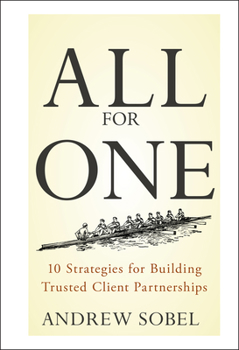All for One: 10 Strategies for Building Trusted Client Partnerships
Select Format
Select Condition 
Book Overview
All for One answers these questions with an innovative and comprehensive model for developing enduring, institutional client relationships--what Andrew Sobel refers to as Level 6 Trusted Client Partnerships. It offers readers ten specific strategies that are thoroughly supported by case studies, best practices from leading firms, and implementation tools. The individual professional is principally responsible for five of these strategies, while the firm--the institution--must support and drive the other five. When you successfully execute against all ten of these building blocks, you develop long-term, professional-client partnerships that provide great value to the client and high levels of personal satisfaction and profitability for the service provider.






